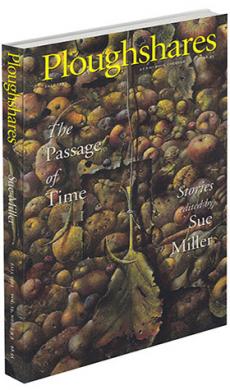rev. of Hurdy Gurdy by Tim Seibles
Hurdy Gurdy
Poems by Tim Seibles. Cleveland State University Press, $10.00 paper. Reviewed by Tony Hoagland.
Appetite, revenge, and celebration are the animating energies in Tim Seibles’s generous-hearted and rambunctious first collection,
Hurdy Gurdy. As the title implies, this is street music of a kind, alternately plaintive and rapturous as it explores issues of adulthood and desire in late-century America.
In their high spiritedness, and their devotion to invention rather than fact, these poems are more reminiscent of the surreal gusto of the Seventies than the tediously sincere, you-gotta-believe-me tone which prevails in the Nineties. Seibles knows, in fact, that we
don’t gotta believe him, so the tongue is kept firmly in the cheek as he proposes sincerity.
Hurdy Gurdy is unapologetic in its representations of male desire, as in the delirious “Treatise”: “Sometimes I feel my penis / like a prisoner in solitary confinement, / raking his rusty cup against the hard bars / of this life pleading for a woman / whose name I don’t even know — a genuine pleading / as though for the secret to a secret / that’s been kept ever since the first sperm serenaded / the pinkness of the womb and coaxed an egg / to come out and play.”
Such erotic transcendentalism is prominent here, but behind it, less noisy, shadowy chords of anxiety and anger play, connected with the experience of being a black man in white America, “crashing the party, a / coffee stain on the lapel of a white, white / tuxedo, a kinky hair floating in a glass / of milk” (“After All”). Though the speaker, ever amusing and amused, determinedly positive, tells himself, “No big deal, it’s cool, no need to / get into a Frederick Douglass kind of thing,” historical and cultural unease intrudes on the more pleasant metaphysics of imagination, and the counterpoint adds a gratifying ballast to some poems. In one, the speaker fantasizes assassinating the president of South Africa. In another, he imagines civilization stemming from one African Eve, the mother of humanity, “that slim, short-tempered woman / whose children crawled / all over the planet, then got big and started / hurting each other — with the conquerers / in their bright armor, trying to finish everything. / I
know where the blame falls. I know / I could twist my brown skin
. . . my / kinky hair into a fist. I know . . .”
Studded with inventive, often hilarious metaphors, these poems offer the reader’s efforts a high pleasure return; they are perhaps most serious, though, in their striking and convincing generosity of heart. Employing reality for their imaginative fuel, the poems in
Hurdy Gurdy comfort and defend the soul.
Tony Hoagland’s collection of poems, Sweet Ruin
(Univ. of Wisconsion Press), won the Brittingham Prize in 1992. This year, he is teaching at Colby College.

